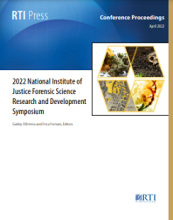Development
Research and Development Using High-level Quantum Chemistry Calculations for the Creation of a Rapid Field Test for the Identification and Differentiation of Hemp and Marijuana
Improving Strategies for Investigating & Prosecuting Hate Crimes: A National Yet Local Approach
How Do “Credible Messenger” Mentors Promote Youth Development? A Retrospective, Longitudinal Study in Atlanta, Birmingham, and Houston
What's Possible with Rapid DNA Technology
What's Possible with Rapid DNA Technology?
NIJ scientist Tracey Johnson joins science writer Sarah Michaud in this episode. They discuss Rapid DNA technology, and Tracey explains the complexities of this technology – its pitfalls and its possibilities.
Reading and Resources from NIJ:
Funding Support for the Operations of the Committee on Law and Justice of the National Academies of Sciences, Engineering, and Medicine
Tribal Crime, Justice, and Safety, Part 2
Stacy Lee Reynolds and Christine (Tina) Crossland continue their discussion of tribal crime, justice, and safety, including how Native American persons experience crime victimization at higher rates than non-Native people and the jurisdictional complexities in responding to tribal crime, justice, and safety. Read the transcript.
Listen to the first half of Stacy and Tina’s discussion.
Reading and Resources from NIJ
Tribal-Researcher Capacity Building Grants
What Constitutes Success? Evaluating Legal Services for Victims of Crime, A Formative Evaluation, Webinar, 2021
Technology: Past, Present and Future
Compendium of National Institute of Law Enforcement and Criminal Justice Pamphlets
Research at the College of Police and Security Studies Ljubljana, Slovenia 1996-2001: Book of Research Abstracts
Death Investigation: A Guide for the Scene Investigator
The Evidence We Leave Behind
Conference Proceedings: 2022 National Institute of Justice Forensic Science Research and Development Symposium
Thermal Runaway Behavior of Nickel-manganese-cobalt 18650 Lithium-ion Cells Induced by Internal and External Heating Failures
Learning from Doing Evaluating the Effectiveness of the Second Chance Act Grant Program
Reauthorized in 2018, the Second Chance Act (SCA) aims to reduce recidivism and improve outcomes for people returning from state and federal prisons, local jails, and juvenile facilities through the provision of federal grants. During this panel, National Institute of Justice-funded researchers will detail two ongoing evaluations of the SCA grant program:
- An evaluation of the effectiveness of the SCA grant program per Title V of the First Step Act.
- A longitudinal examination of the long-term impacts of the SCA program.
See the YouTube Terms of Service and Google Privacy Policy
The Hidden Costs of Reentry: Understanding the Barriers to Removing a Criminal Record
NIJ hosted a webinar to discuss under-researched aspects of reentry: expungement of criminal records and the impact of those records. This webinar includes a presentation of ongoing research projects examining the impact of legal aid for expungement and past research projects studying the accuracy and permanency of criminal records and the prevalence of collateral consequences of conviction. A Q&A session will conclude this webinar.
See the YouTube Terms of Service and Google Privacy Policy







